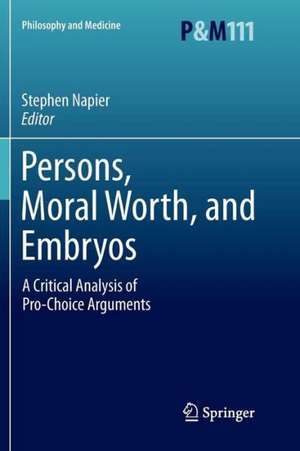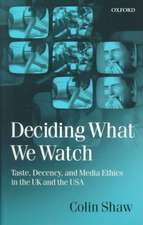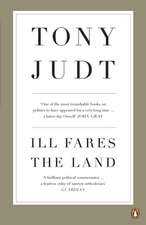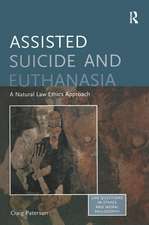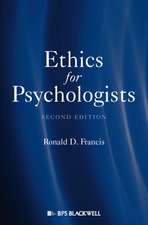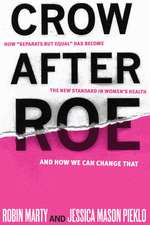Persons, Moral Worth, and Embryos: A Critical Analysis of Pro-Choice Arguments: Philosophy and Medicine, cartea 111
Editat de Stephen Napieren Limba Engleză Paperback – 3 aug 2013
| Toate formatele și edițiile | Preț | Express |
|---|---|---|
| Paperback (1) | 640.55 lei 6-8 săpt. | |
| SPRINGER NETHERLANDS – 3 aug 2013 | 640.55 lei 6-8 săpt. | |
| Hardback (1) | 644.95 lei 6-8 săpt. | |
| SPRINGER NETHERLANDS – 22 iun 2011 | 644.95 lei 6-8 săpt. |
Din seria Philosophy and Medicine
- 18%
 Preț: 3071.11 lei
Preț: 3071.11 lei - 18%
 Preț: 789.52 lei
Preț: 789.52 lei - 15%
 Preț: 636.80 lei
Preț: 636.80 lei - 15%
 Preț: 643.16 lei
Preț: 643.16 lei - 15%
 Preț: 644.95 lei
Preț: 644.95 lei - 18%
 Preț: 949.23 lei
Preț: 949.23 lei - 5%
 Preț: 1154.22 lei
Preț: 1154.22 lei - 18%
 Preț: 1223.74 lei
Preț: 1223.74 lei - 15%
 Preț: 645.60 lei
Preț: 645.60 lei - 18%
 Preț: 949.23 lei
Preț: 949.23 lei - 15%
 Preț: 644.49 lei
Preț: 644.49 lei - 18%
 Preț: 948.79 lei
Preț: 948.79 lei - 24%
 Preț: 780.13 lei
Preț: 780.13 lei - 18%
 Preț: 1227.04 lei
Preț: 1227.04 lei -
 Preț: 395.85 lei
Preț: 395.85 lei - 5%
 Preț: 1103.95 lei
Preț: 1103.95 lei - 18%
 Preț: 945.30 lei
Preț: 945.30 lei - 18%
 Preț: 1383.94 lei
Preț: 1383.94 lei - 15%
 Preț: 643.34 lei
Preț: 643.34 lei - 18%
 Preț: 1130.45 lei
Preț: 1130.45 lei - 15%
 Preț: 639.59 lei
Preț: 639.59 lei -
 Preț: 389.70 lei
Preț: 389.70 lei - 18%
 Preț: 948.61 lei
Preț: 948.61 lei - 5%
 Preț: 1092.79 lei
Preț: 1092.79 lei - 20%
 Preț: 557.46 lei
Preț: 557.46 lei - 15%
 Preț: 642.36 lei
Preț: 642.36 lei -
 Preț: 385.08 lei
Preț: 385.08 lei - 15%
 Preț: 644.95 lei
Preț: 644.95 lei
Preț: 640.55 lei
Preț vechi: 753.60 lei
-15% Nou
Puncte Express: 961
Preț estimativ în valută:
122.58€ • 133.11$ • 102.97£
122.58€ • 133.11$ • 102.97£
Carte tipărită la comandă
Livrare economică 22 aprilie-06 mai
Preluare comenzi: 021 569.72.76
Specificații
ISBN-13: 9789400736597
ISBN-10: 9400736592
Pagini: 300
Ilustrații: XIV, 286 p.
Dimensiuni: 155 x 235 x 16 mm
Greutate: 0.42 kg
Ediția:2011
Editura: SPRINGER NETHERLANDS
Colecția Springer
Seriile Philosophy and Medicine, Catholic Studies in Bioethics
Locul publicării:Dordrecht, Netherlands
ISBN-10: 9400736592
Pagini: 300
Ilustrații: XIV, 286 p.
Dimensiuni: 155 x 235 x 16 mm
Greutate: 0.42 kg
Ediția:2011
Editura: SPRINGER NETHERLANDS
Colecția Springer
Seriile Philosophy and Medicine, Catholic Studies in Bioethics
Locul publicării:Dordrecht, Netherlands
Public țintă
ResearchCuprins
Introduction: What are Persons? What is Valuable?
Stephen Napier.-
Part 1. Philosophical Considerations.-
I was Once a Fetus: That is Why Abortion is Wrong
Alexander Pruss.-
Brain Life and the Argument from Potential: Affirming the Ontological Status of Human Embryos and Fetuses,
Jason T. Eberl and Brandon P. Brown.-
The Human Being, a Person of Substance: A Response to Dean Stretton, Francis J. Beckwith.-
The Concept of Person in Bioethics, Anselm Winfried Müller.-
Abortion and Virtue Ethics Mathew Lu.-
Embryos, Four-Dimensionalism, and Moral Status, David Hershenov.-
The Christian Hypothesis, David W. Fagerberg.-
Fetal Interests, Fetal Persons, and Human Goods, Christopher Tollefsen.-
Part 2. Scientific Considerations.-
Fetal Pains and Fetal Brains, A.A. Howsepian.-
A Biological Definition of the Human Embryo,
Maureen L. Condic.-
Part 3. Perspectives from Law and Political Philosophy.-
Public Reason and Abortion Revisited, David Thunder.-
Sexual Markets and the Law, Helen M. Alvaré.-
Index.
Stephen Napier.-
Part 1. Philosophical Considerations.-
I was Once a Fetus: That is Why Abortion is Wrong
Alexander Pruss.-
Brain Life and the Argument from Potential: Affirming the Ontological Status of Human Embryos and Fetuses,
Jason T. Eberl and Brandon P. Brown.-
The Human Being, a Person of Substance: A Response to Dean Stretton, Francis J. Beckwith.-
The Concept of Person in Bioethics, Anselm Winfried Müller.-
Abortion and Virtue Ethics Mathew Lu.-
Embryos, Four-Dimensionalism, and Moral Status, David Hershenov.-
The Christian Hypothesis, David W. Fagerberg.-
Fetal Interests, Fetal Persons, and Human Goods, Christopher Tollefsen.-
Part 2. Scientific Considerations.-
Fetal Pains and Fetal Brains, A.A. Howsepian.-
A Biological Definition of the Human Embryo,
Maureen L. Condic.-
Part 3. Perspectives from Law and Political Philosophy.-
Public Reason and Abortion Revisited, David Thunder.-
Sexual Markets and the Law, Helen M. Alvaré.-
Index.
Textul de pe ultima copertă
“Bioethicists have achieved consensus on two ideas pertaining to beginning of life issues: (1) persons are those beings capable of higher-order cognition, or self-consciousness, and (2) it is impermissible to kill only persons. As a consequence, a consensus is reached regarding the permissibility of both destroying human embryos for research purposes and abortion. The present collection aims to interact critically with this consensus. Authors address various aspects of this ‘orthodoxy’. Issues discussed include: theories of personhood and in particular the role of thought experiments used in support of such theories; the notion of an intrinsic potential and the moral relevance of having one; new formulations of the virtue argument against abortion rights; four-dimensionalism and abortion; the notion of moral status and who (or what) has it; scientific accounts of what a human being is, as well as addressing empirical evidence of fetal consciousness; and analysis of the public policy implications given the epistemic status of pro-choice arguments. Given the issues discussed and that the arguments in critical focus are fairly new, the collection provides a novel, comprehensive, and rigorous analysis of contemporary pro-choice arguments.”
Caracteristici
The book offers novel arguments and explores new territory on the abortion issue. The book brings together a host of primarily analytical philosophers, public policy persons, and scientists to provide a comprehensive analysis of the abortion issue. The book aims to tether its analyses to specific claims, thereby entering into a dialogue with abortion-rights advocates.
